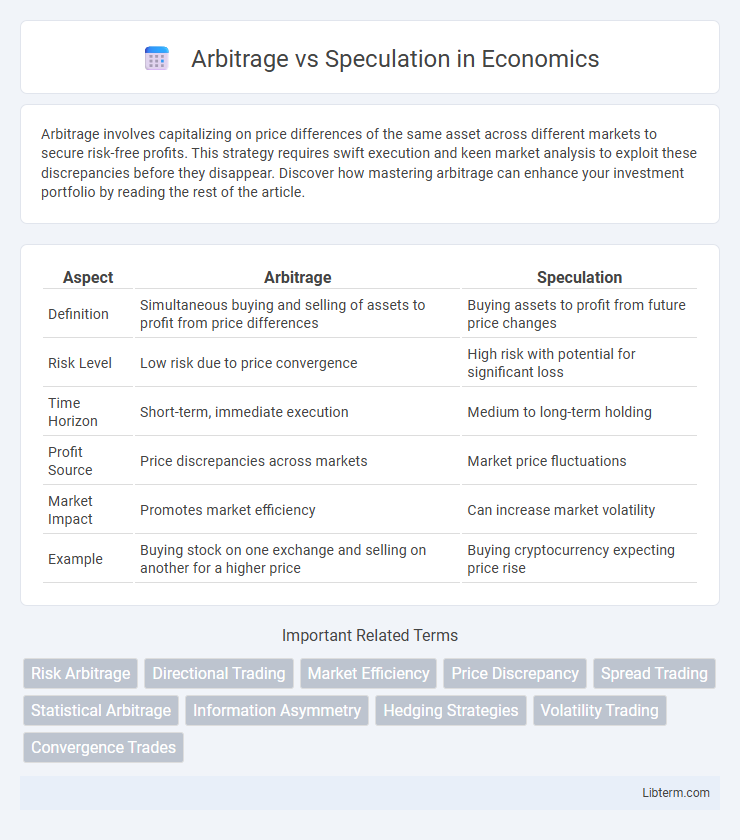Arbitrage involves capitalizing on price differences of the same asset across different markets to secure risk-free profits. This strategy requires swift execution and keen market analysis to exploit these discrepancies before they disappear. Discover how mastering arbitrage can enhance your investment portfolio by reading the rest of the article.
Table of Comparison
| Aspect | Arbitrage | Speculation |
|---|---|---|
| Definition | Simultaneous buying and selling of assets to profit from price differences | Buying assets to profit from future price changes |
| Risk Level | Low risk due to price convergence | High risk with potential for significant loss |
| Time Horizon | Short-term, immediate execution | Medium to long-term holding |
| Profit Source | Price discrepancies across markets | Market price fluctuations |
| Market Impact | Promotes market efficiency | Can increase market volatility |
| Example | Buying stock on one exchange and selling on another for a higher price | Buying cryptocurrency expecting price rise |
Defining Arbitrage: Core Concepts
Arbitrage involves simultaneously buying and selling an asset in different markets to exploit price discrepancies and secure risk-free profits, leveraging market inefficiencies. It hinges on the principle of price convergence, where arbitrageurs ensure prices align across markets by correcting imbalances. Core concepts include zero-net investment, instantaneous execution, and risk minimization, differentiating arbitrage from speculation, which accepts risk for potential gain.
Understanding Speculation: An Overview
Speculation involves taking financial risks by buying assets with the expectation of profiting from future price fluctuations, often relying on market trends and sentiment rather than intrinsic value. Unlike arbitrage, which exploits price discrepancies for nearly risk-free gains, speculation embraces uncertainty and potential volatility to achieve higher returns. Key instruments for speculation include stocks, commodities, currencies, and derivatives, where traders anticipate market movements based on analysis or intuition.
Key Differences Between Arbitrage and Speculation
Arbitrage involves simultaneously buying and selling assets in different markets to exploit price discrepancies, ensuring almost risk-free profit, while speculation entails taking on significant risk by predicting future price movements to gain high returns. Arbitrage relies on market efficiency and quick execution to capitalize on price differences, whereas speculation depends heavily on market volatility and trader's insight or analysis. The key difference lies in arbitrage's focus on minimizing risk through price convergence, contrasting with speculation's acceptance of risk for potential reward based on price trends.
Risk Profiles: Arbitrage vs Speculation
Arbitrage involves exploiting price discrepancies across markets with minimal risk by simultaneously buying and selling assets to lock in guaranteed profits. Speculation assumes higher risk by betting on future price movements, often leveraging market volatility to achieve substantial returns but facing potential significant losses. The key difference in risk profiles lies in arbitrage's low-risk, low-return approach versus speculation's high-risk, high-reward strategy.
Common Strategies in Arbitrage
Arbitrage strategies commonly involve exploiting price discrepancies between different markets or instruments to secure risk-free profits by simultaneously buying low and selling high. Popular approaches include spatial arbitrage, which capitalizes on geographical price differences, and triangular arbitrage, leveraging currency exchange rate imbalances within forex markets. Statistical arbitrage employs quantitative models to identify and trade temporary mispricings across correlated assets, minimizing exposure to market direction.
Popular Speculation Techniques
Popular speculation techniques include day trading, momentum investing, and options trading, each aiming to capitalize on short-term price movements in financial markets. Speculators often use technical analysis, leveraging chart patterns and indicators to predict price trends and optimize entry and exit points. Unlike arbitrage, which exploits price inefficiencies for risk-free profits, speculation involves higher risk by anticipating future price changes based on market sentiment and volatility.
Market Conditions Favorable to Arbitrage
Arbitrage opportunities arise in efficient markets where price discrepancies exist momentarily across different exchanges or asset classes, allowing traders to exploit these gaps with minimal risk. Favorable market conditions for arbitrage include high liquidity, low transaction costs, and rapid information flow, enabling quick execution and profit realization. In contrast to speculation, which relies on forecasting market direction, arbitrage depends on identifying temporary imbalances caused by market inefficiencies or latency.
Factors Driving Speculative Activities
Speculative activities are driven primarily by factors such as market volatility, the prospect of high returns, and the availability of leverage, which amplify potential gains and risks. Traders exploit price fluctuations and market inefficiencies, often influenced by news events, economic indicators, and behavioral biases. Unlike arbitrage, speculation relies heavily on market direction and timing, making it inherently riskier but with opportunities for substantial profit.
Profit Potential: Arbitrage Compared to Speculation
Arbitrage offers relatively lower but more consistent profit potential by exploiting price discrepancies across markets with minimal risk. Speculation carries higher profit potential due to market direction bets but involves greater exposure to volatility and uncertainty. Investors seeking steady returns may prefer arbitrage, while those aiming for significant gains might engage in speculation despite its risks.
Regulatory and Ethical Considerations
Arbitrage involves exploiting price discrepancies across markets with minimal risk, often regulated to ensure market fairness and prevent manipulation, while speculation entails higher risk-taking based on market predictions and is subject to stricter regulatory scrutiny for potential market destabilization. Regulatory bodies like the SEC and CFTC enforce rules to curb unethical speculative behavior such as insider trading and market manipulation. Ethical considerations emphasize transparency and fairness, with arbitrage generally viewed as market-corrective, whereas speculation may raise concerns about market volatility and investor protection.
Arbitrage Infographic

 libterm.com
libterm.com